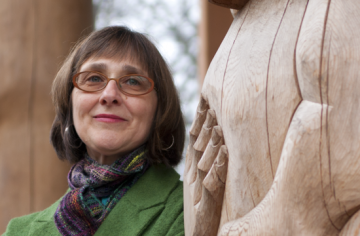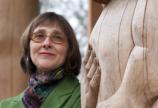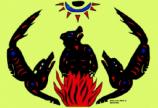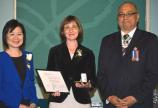Teaming up to revitalize Salish languages
- Tara Sharpe

On Apr. 25, Dr. Ewa Czaykowska-Higgins (linguistics) accepted a 2012 BC Community Achievement Award at Government House in Victoria in recognition of her highly consultative approach on the Coast and Straits Salish language revitalization project. She was not thinking of herself that day.
She begins this story—because that is what it is, primarily about words and people—with emphasizing first how many others were involved not only in development and completion but also conceptualization of the Community University Research Alliance (CURA) language revitalization partnership.
“This award recognizes the value and importance of language revitalization to Aboriginal communities, and I want to share the applause with the Coast and Straits Salish Aboriginal communities of Vancouver Island who have been working so hard and for so long to reclaim their languages,” says Czaykowska-Higgins. There were approximately 90 community participants and contributors. She also points to co-investigators Drs. Suzanne Urbanczyk (linguistics) and Tom Hukari (professor emeritus), the CURA Elders advisory committee, steering committee and management team including community coordinators, Andy Paul, Tim Kulchyski, and Marlo Thomas-Paige, as well as Deanna Daniels, formerly of the First Peoples’ Heritage, Language and Culture Council (FPHLCC), and numerous colleagues and students.
“What the UVic team was trying to do was facilitate the creation of infrastructure and materials to support the language revitalization goals of the partner communities,” she adds. “UVic was an ally in all the different aspects of this very deeply collaborative project.”
The community-based project (Jan. 2004-Dec. 2009) had its early beginnings in 2001 among other related activities when John Elliott Sr. of the Saanich Native Heritage Society first approached UVic. This CURA was a partnership between the Heritage Society (representing four First Nations communities), the Hul’q’umi’num’ Treaty Group (six communities), the First Peoples’ Cultural Foundation, the FPHLCC and the university. It focused on two different but closely related languages: SENĆOŦEN, the language of the WSÁNEĆ people whose ancestral territory includes the Saanich Peninsula and Gulf Islands, and Hul’q’umi’num’, the language of First Nations communities living on and north of the Malahat to north of Nanaimo.
“And all the partners were listening to each other. Everyone’s voice was heard and valued. It’s really hard to do this well, but you cannot do a project like this without meaningful consultation. We were listening to the voices of the Elders who told us this is what we had to do.”
She is echoing project coordinator Thomas-Paige, who commented in the final CURA report that “we gathered the Elders together…and their question to us was, 'Is this meaningful consultation, or is this just a tick off of a list, or are you just putting a check mark in the box saying that you met with us…and they said if this isn't meaningful, you can basically expect not to meet with us again. But if this is meaningful, we will welcome you.”
As Thomas-Paige points out, the CURA team “needed to earn the trust of the Elders due to the practices of some earlier researchers who appropriated the knowledge of Aboriginal people.”
Czaykowska-Higgins pays tribute to the “kind and generous teachers” in the very early days of her academic study: “the Elders with whom I worked in the very beginning taught me a lot.” And it is precisely this ability to foster collaboration and respect that garnered her a provincial award last month.
Over the years her experiences have reflected her awareness and love of languages and concerns with social justice. Czaykowska-Higgins comes “from an immigrant family, so language has always been very important to me. I didn’t speak English at first, only Polish, so language is at the centre of who I am as a person.” She is also a long-time activist and helped start UBC’s Amnesty International branch in the late 1970s.
“What surprised me with this project was how hard it was to do it properly,” says Czaykowska-Higgins. “For people who study linguistics to work this way? This is not the predominant methodology and we were carving out new methods for the linguists and for ourselves as a group all together.” Among others at UVic, she identifies Drs. Leslie Saxon (linguistics), former chair, and Andrew Rippin (history), former dean, for not only embracing the project in its early stages but supporting it in any way necessary administratively. “Universities don’t always have structures to fit this kind of project,” she explains. “They both found ways to accommodate that.”
Czaykowska-Higgins underscores the importance of the existing support at UVic for language revitalization research and programs, including the Certificate in Aboriginal Language Revitalization program through the Dept. of Linguistics and Division of Continuing Studies and the Indigenous Education and Indigenous Language Revitalization degrees offered through the Faculty of Education, with the latter degree offered in partnership with the linguistics department.
The key points in the final CURA report contain a cautionary note: language loss is occurring at an alarming rate in many Indigenous communities not only in Canada but elsewhere too. (It is estimated that half of the world’s approximately 6,000 languages will disappear in this century.) BC is home to over 30 languages and nearly 60 dialects. This project is one contribution to the positive reversal of this loss in the SENĆOŦEN- and Hul’q’umi’num’-speaking communities.
Together, the CURA partners have created new tools and programs (including DVDs, training manuals and language lessons), evaluated current systems and strengthened partnerships to keep the revitalized languages thriving well into the future. Email eczh@uvic.ca for a copy of the report.
The five-year $900,000 CURA grant was funded through the Social Sciences and Humanities Research Council.
Click here for the original Dec. 2003 announcement or here for the February 2004 story, when the partnership began.
Czaykowska-Higgins joined 35 other recipients at the ninth annual BC Community Achievement Awards in April 2012.
She is also one of the new Faces of UVic Research in the recently launched UVic YouTube research video series.
But the last words are Thomas-Paige’s:
"This very topic…has deep roots in genocide and the residential school era, and…the smallpox, the tuberculosis epidemics…if you don't know the history and how it affects my people, you kinda wander around and you bump into walls…Make sure your heart's in the right place and your intentions are good, expect a steep learning curve, and be truthful and honest. It is not about the researcher, it is about the community and its ideas.”



